Octet rule - Guides d'étude, Notes de cours & Résumés
Vous recherchez les meilleurs guides d'étude, notes d'étude et résumés sur Octet rule ? Sur cette page, vous trouverez 455 documents pour vous aider à réviser pour Octet rule.
Page 3 sur 455 résultats
Trier par

-
Lewis Dot Structure Exam 2024 Questions and Answers 100% Pass
- Examen • 2 pages • 2024
- Disponible en pack
-
 KatelynWhitman
KatelynWhitman
-
- $7.99
- + en savoir plus
Lewis Dot Structure Exam 2024 Questions and Answers 100% Pass Valence Electrons - # of electrons in the highest principle energy level How to find valence electrons - look at ROMAN NUMERAL group number at top of group Octet Rule - all noble gases have 8 valence e. (except hydrogen which has 2 e.) Lewis Dot Structure - Shows how atoms bond in covalent compounds 3 steps to writing lewis dot structure - 1) add up all of the valence e. 2) determine the central atom 3) distribute the valence e...
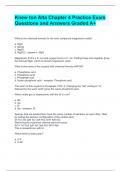
-
Knew ton Alta Chapter 4 Practice Exam Questions and Answers Graded A+
- Examen • 12 pages • 2024
-
Disponible en pack
-
julianah420
-
- $17.99
- + en savoir plus
Knew ton Alta Chapter 4 Practice Exam Questions and Answers Graded A+ What is the chemical formula for the ionic compound magnesium oxide? a. MgO b. MnO2 c. Mg2O d. Mg2O3 a. MgO Magnesium forms a 2+ ion and oxygen forms a 2− ion. Putting these ions together gives the formula MgO, which is named magnesium oxide. What is the name of the oxyacid with chemical formula H3PO4? a. Phosphorus acid b. Phosphoric acid c. Phosphate acid d. Hydrophosphoric acid b. Phosphoric acid ...
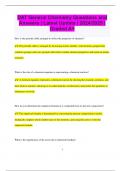
-
DAT General Chemistry Questions and Answers | Latest Update | 2024/2025 | Graded A+
- Examen • 30 pages • 2024
- Disponible en pack
-
 SterlingScores
SterlingScores
-
- $10.66
- + en savoir plus
DAT General Chemistry Questions and Answers | Latest Update | 2024/2025 | Graded A+ How is the periodic table arranged to reflect the properties of elements? The periodic table is arranged by increasing atomic number, with elements grouped into columns (groups) and rows (periods) that reflect similar chemical properties and trends in atomic structure. What is the role of a chemical equation in representing a chemical reaction? A chemical equation represents a chemical reaction by...
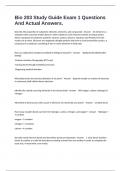
-
Bio 203 Study Guide Exam 1 Questions And Actual Answers.
- Examen • 11 pages • 2024
-
Disponible en pack
-
 TestSolver9
TestSolver9
-
- $10.29
- + en savoir plus
Describe the properties of subatomic elements, elements, and compounds - Answer An element is a substance that cannot be broken down to other substance. Each element consists of unique atoms. Atoms composed of subatomic particles: neutron, proton, electron. Neutrons and Protons form the nucleus of an atom. Electrons are negatively charged particles that form a cloud around the nucleus. A compound is a substance consisting of two or more elements in fixed ratio. How can radioactive isotopes...
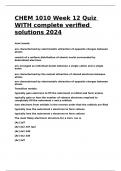
-
CHEM 1010 Week 12 Quiz WITH complete verified solutions 2024
- Examen • 7 pages • 2024
-
 GUARANTEEDSUCCESS
GUARANTEEDSUCCESS
-
- $14.99
- + en savoir plus
Ionic bonds: are characterized by electrostatic attraction of opposite charges between atoms consist of a uniform distribution of atomic nuclei surrounded by delocalized electrons are arranged as individual bonds between a single cation and a single anion are characterized by the mutual attraction of shared electrons between atoms are characterized by electrostatic attraction of opposite charges between atoms Transition metals: typically gain electrons to fill the outermost ...
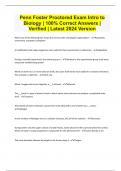
-
Penn Foster Proctored Exam Intro to Biology | 100% Correct Answers | Verified | Latest 2024 Version
- Examen • 9 pages • 2024
-
 AmazingGrace
AmazingGrace
-
- $8.49
- + en savoir plus
Which one of the following lists shows the correct order of biological organization? - Population, community, ecosystem, biosphere A modification that makes organisms more suited to their environment is called a/an: - Adaptation During a scientific experiment, the control group is: - Identical to the experimental group in all areas except the variable being tested When an atom has 2 or more electron shells, the outer shell will be most stable if it contains 8 electrons. This concept is cal...
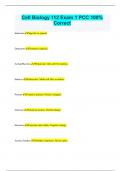
-
Cell Biology 112 Exam 1 PCC 100% Correct
- Examen • 13 pages • 2024
- Disponible en pack
-
 StellarScores
StellarScores
-
- $9.99
- + en savoir plus
Cell Biology 112 Exam 1 PCC 100% Correct Induction Specific to general Deduction General to specific Archae/Bacteria Prokaryote. One-cell. No nucleus. Eukarya Eukaryotes. Multi-cell. Has a nucleus. Protons Found in nucleus. Positive charged. Nuetrons Found in nucleus. Neutral charge. Electrons Found in outer shells. Negative charge. Atomic Number Number of protons. Never varies. Atomic Mass Number of protons and neutrons in the nucleus. To determine number of nue...
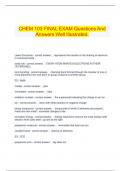
-
CHEM 103 FINAL EXAM Questions And Answers Well Illustrated.
- Examen • 21 pages • 2024
-
 techgrades
techgrades
-
- $12.49
- + en savoir plus
CHEM 103 FINAL EXAM Questions And Answers Well Illustrated. Lewis Structures - correct answer. represents the transfer or the sharing of electrons in chemical bonds octet rule - correct answer. EVERY ATOM WANTS 8 ELECTRONS IN THEIR OUTERSHELL ionic bonding - correct answer. chemical bond formed through the transfer of one or more electrons from one atom or group of atoms to another group EX : NaBr metals - correct answer. give nonmetals - correct answer. ...
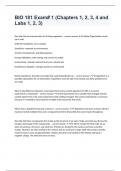
-
BIO 181 Exam# 1 (Chapters 1, 2, 3, 4 and Labs 1, 2, 3) well answered
- Examen • 6 pages • 2024
- Disponible en pack
-
 BravelRadon
BravelRadon
-
- $12.99
- + en savoir plus
BIO 181 Exam# 1 (Chapters 1, 2, 3, 4 and Labs 1, 2, 3)Describe the six characteristics of all living organisms. - correct answer Cellular Organization: made up of cells Ordered Complexity: very complex Sensitivity: responds to environment Growth, Development, and Reproduction: Energy Utilization: make energy and convert to usable Homeostasis: maintain internal factors at a steady rate Evolutionary Adaption: changes based on environment Define hypothesis. Describe two traits that a good...
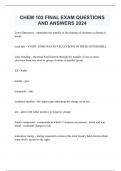
-
CHEM 103 FINAL EXAM QUESTIONS AND ANSWERS 2024
- Examen • 35 pages • 2024
-
Disponible en pack
-
 CleanA
CleanA
-
- $13.49
- + en savoir plus
Lewis Structures - represents the transfer or the sharing of electrons in chemical bonds octet rule - EVERY ATOM WANTS 8 ELECTRONS IN THEIR OUTERSHELL ionic bonding - chemical bond formed through the transfer of one or more electrons from one atom or group of atoms to another group EX : NaBr metals - give nonmetals - take oxidation number - the superscript indicating the charge on an ion ion - atom with either positive or negative charge binary compound - compounds in wh...

Combien avez-vous déjà dépensé pour Stuvia ? Imaginez que vous soyez beaucoup plus nombreux à payer pour des notes d'étude, mais cette fois-ci, c'est VOUS qui vendez. Ka-ching ! Découvrez tout sur gagner de l'argent sur Stuvia


